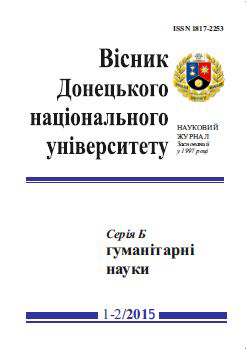Genetic relationship of the methods of science and Christian theology.
Keywords:
science, truth, theology, modernity, theory, method, axiomsAbstract
In article the author tries to trace the genetic and the conceptual connection of ontological axioms of the modern science and Christian theology. For greater relevance were chosen for a scientific theory of the early modern period, however, contemporary scientific concepts are built on the same axioms, though not consciously, and axioms are considered unprovable and irrational. The article begins with an analysis of worldview of Nicolaus Copernicus, influenced the development of his heliocentric picture of the world. From the author`s point of view, theological thinking led to the pursuit of scientific teaching of Copernicus, Keppler, Galilei and other scientists of the early modern time. These scientists were convinced in the existence of God, the likeness of the human mind to the divine (due to the ability to understand the Truth), ideal basis and excellence of the World. On the other hand, already Galilei used in his researches methods, which are popular today, including a scientific experiment. Theological grounds also has a physical teaching of eminent scholar Nicolas Oresme, which displays the idea of the relationship of qualities in the Universe from the doctrine of Petrus Lombardus about the different levels of grace. However, scientific method of constructing of the object can be detected already at the early scholastics, for example, Eriugena. Author believes that the contemporary theories of construction of scientific subject, and overall theory of science, preserved the elements of the early Modern era as axioms, although not mention the Christian foundations of this deep level. Meanwhile, if you add them in reference to Christian theology, these theories will appear more fully and convincingly. As an example, author selected theory L. Laudan and V. Stepin, however, the same situation is observed in the case of other philosophical theories of science in the twentieth centuryReferences
Білокобильський О.В. Від науки до міфу. Онтологічні дослідження. Донецьк: Апекс, 2004. – 202 с.
Белокобыльский А.В. Основания и стратегии рациональности Модерна. – К.: Вид. ПАРАПАН, 2008. – 244 с.
Гайденко П.П. Эволюция понятия науки (XVII-XVIII вв.). Формирование программ нового времени. – М: Наука, 1987. – 448 c.
Галилей Г. Диалог о двух главнейших системах мира – птолемеевой и коперниковой // Избранные труды в двух томах. – Т1. – М.: Наука. – 1964. – С. 97-562.
Декарт Р. Размышления о первой философии, в коих доказывается существование Бога и различие между человеческой душой и телом // Сочинения в двух томах / Рене Декарт. – М., 1994, Т.2. – С. 3-72.
Декарт Р. Рассуждение о методе, чтобы верно направлять свой разум и отыскивать истину в науках // Сочинения в двух томах / Рене Декарт. – М., 1989, Т.1. – С. 250-296.
Зубов В.П. Трактат Николая Орема «О конфигурации качеств» / Н. Орем. – М.: Эдиториал УРСС, 2000. – C. 5-39.
Койре А. Пустота и бесконечное пространство в XIV веке / А. Койре // Очерки истории философской мысли. – М., 2003. – С. 74-108.
Николай Орем. О конфигурации качеств Под. ред. В.П.Зубова. Пер. с лат. / Н. Орем. – М. : Эдиториал УРСС, 2000. – 136 с.
Ньютон И. Оптика, или Трактат об отражениях, преломлениях, изгибаниях и цветах света / Исаак Ньютон. – М., Л., 1927. – 370 с.
Петров В. тотальность природы и методы ее исследования в «Перифюсеон» Эриугены / В. Петров // Философия природы в античности и в средние века. – М., 2000. – С. 417-479.

